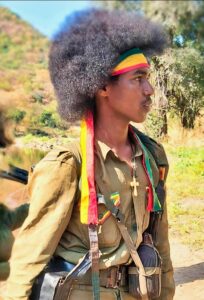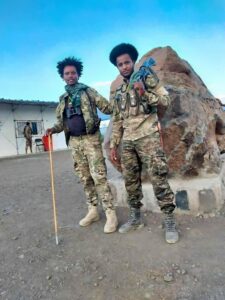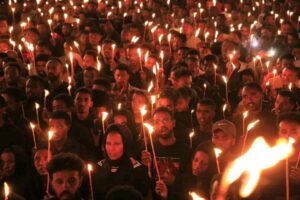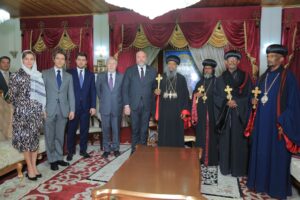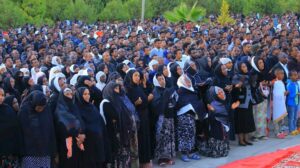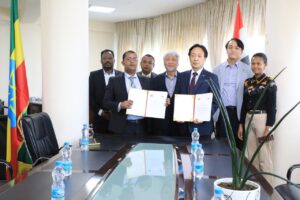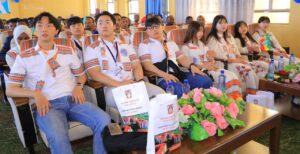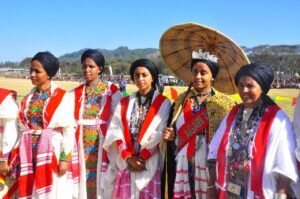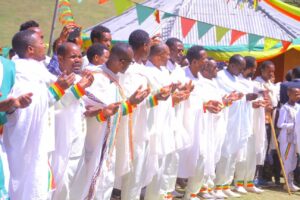Ethiopia › Forums › Ludicrous World › THE OROMO LIBERATION FRONT (OLF) › ABIY AHMED CALLED FOR ELIMINATING THE OROMO LIBERATION FRONT (OLF)
ABIY AHMED CALLED FOR ELIMINATING THE OROMO LIBERATION FRONT (OLF)
On December 9, Ethiopian Prime Minister Abiy Ahmed called for eliminating the Oromo Liberation Front (OLF), signalling his next big move in redefining the Ethiopian state. Abiy made the perilous claim during a joint presser with Kenyan President Uhuru Kenyatta on the inauguration of a one-stop border post to boost trade between the two countries.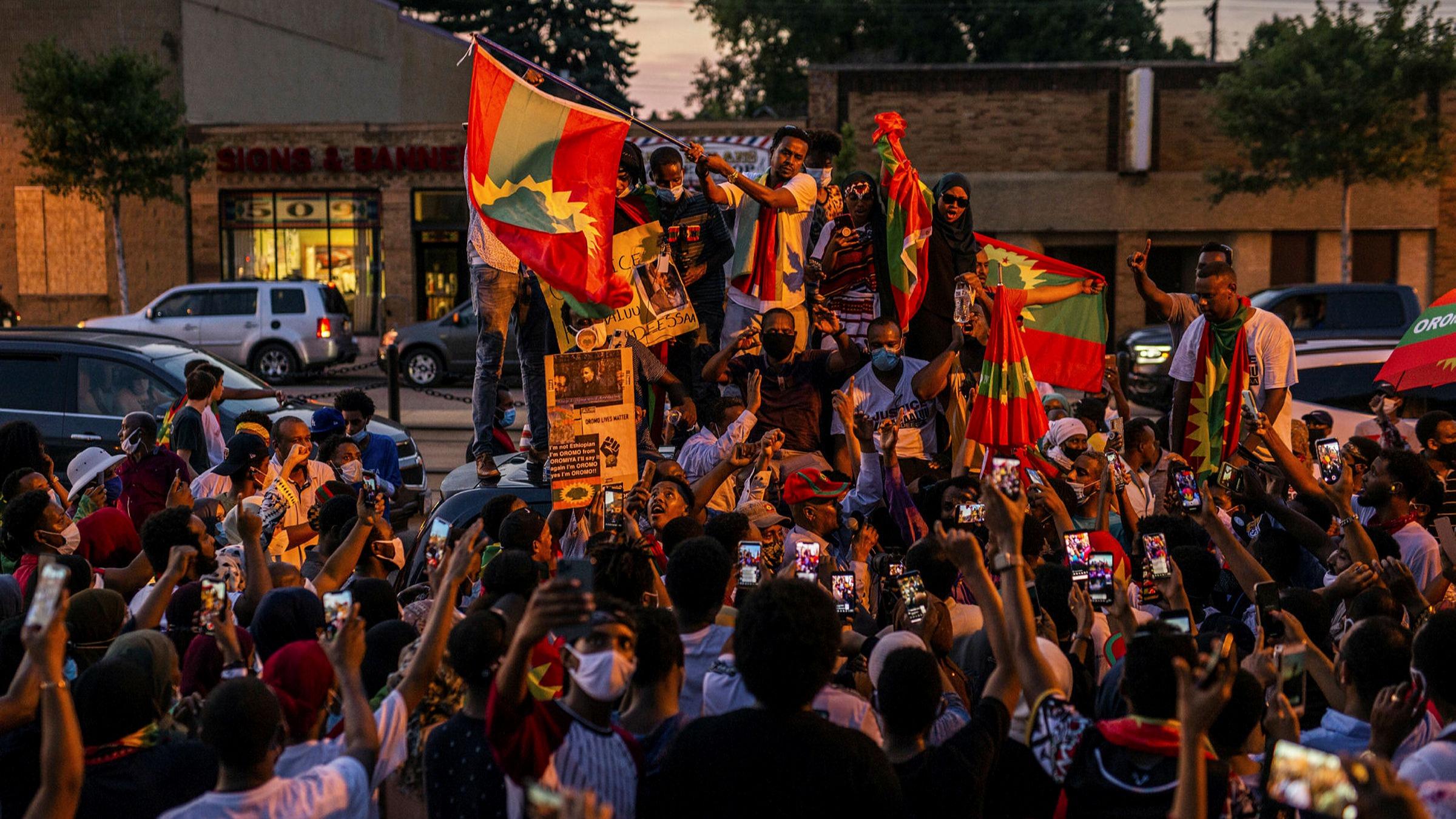
By M Masoo
Unprompted, he told the audience: “If we could eliminate Al-Shabaab and OLF from this region, you can see how these people can be transformed into one family, one country, one people with great joy and cooperation.”
In true-and-tried Abiy fashion, when he switched to Afaan Oromo, he left out the explosive call to eliminate the OLF—a vanguard organization etched into the consciousness and lived experiences of the Oromo nation. The premier is renowned for his doublespeak saying different things about the same thing to different audiences. Unsurprisingly, the comment excited Abiy’s Oromophobic supporters but his true intentions, perhaps inadvertently divulged, were hardly a surprise.
Abiy is on a victory lap, still oblivious to the menacing war he has begun. The Eritrea-backed military campaign against the Tigray People’s Liberation Front (TPLF) is not over yet, but it has dealt a significant blow to the group. Abiy appears to have won the battle thanks to Eritrea’s active involvement in the planning and execution of the war and, perhaps more importantly, the alleged involvement of drones from the United Arab Emirates.
He is now turning his attention to another ruinous political turmoil further South: the Oromo opposition. The Abiy administration’s campaign to dismantle any viable opposition in Oromia, the region he hails from, has been ongoing for more than two years. Tens of Oromo opposition party supporters and leaders have been harassed, intimidated, arrested, and some are being subjected to political show trials.
Abiy’s reference to the OLF—a legally registered party with overwhelming support among the Oromo people—in the same breath as Al-Shabab, an internationally proscribed terrorist organization, is straight out of the Ethiopian People’s Revolutionary Democratic Front (EPRDF) playbook. The TPLF dominated EPRDF used the discourse of terrorism to delegitimize the OLF and its causes, comparing it to Al-Shabab, Boko Haram, and other terrorist organizations. His statement reignited the virulent debate on the nature of the recent changes in Ethiopian politics and the position of the Oromo within the Ethiopian state.
Abiy was catapulted to the position of prime minister by the Oromo protests, representing the Oromo wing of the EPRDF. Many saw this as a dramatic shift that signalled the end of Oromo marginalization in Ethiopia. However, the human rights conditions in Oromia over the last two years, and the abuses and heavy-handed treatment meted out to his opponents across the region shows the position of the Oromo as a whole has worsened.
Under Abiy, Oromos faced sweeping repression and egregious violations of human rights. In May, Amnesty International accused government forces of “horrendous human rights violations including burning homes to the ground, extrajudicial executions, rape, arbitrary arrests, and detentions, sometimes of entire families.” Since then, the situation in several parts of Oromia has worsened, particularly since the assassination of Haacaaluu Hundeessaa. Abiy and PP officials were quick to implicate the Oromo Liberation Army (OLA) and TPLF for the killing of the famed singer.
The government used the anger and violence that followed Haacaaluu’s murder to arrest several prominent leaders of the two main Oromo opposition parties, the Oromo Federalist Congress (OFC) and the OLF. It closed their offices and arrested many of their leaders and members across the country, leading the OFC to announce its intention to withdraw from the next election.
OLF and the Ethiopian state
Founded in the 1970s to end the political, cultural and economic oppression of the Oromo, the OLF struggles for the Oromo right to self-determination. Since then, successive Ethiopian rulers have tried to eliminate the group. In fact, as a core member of the TPLF-led EPRDF, Abiy spent years spying on the OLF and trying to co-opt or uproot the group.
In 1991, OLF was among a coterie of liberation fronts that overthrew the communist regime of Mengistu Hailemariam. It was also part of the Transitional Government of Ethiopia that helped set in motion the introduction of multinational federalism. However, when OLF’s support in Oromia proved insurmountable for the TPLF-controlled Oromo Peoples Democratic Organization (OPDO), TPLF forced OLF out of the transitional arrangement.
The EPRDF then launched a scorched earth campaign to eliminate the OLF. Many of its top leaders were killed, many disappeared, and tens of thousands of OLF leaders and members were jailed or forced into exile. EPRDF, in which Abiy was a core member, oversaw nearly three decades of repression against every dissenting Oromo using the OLF as a pretext—so much so that former Prime Minister Meles Zenawi once insinuated, “if you scratch every Oromo, you get an OLF” – a collective demonization that had real-life consequences for many. By 2008, former top TPLF leaders remarked that Ethiopian “prisons speak Afaan Oromo” due to the disproportionate targeting of Oromo nationalists.
The repression and continued marginalization of the Oromo ignited the widespread protests (2014-2018) that ended TPLF’s hegemony and paved the way for Abiy’s rise. The new prime minister is continuing the work he did to eliminate the group as a TPLF spy.
As soon as the OLF returned to Ethiopia in 2018, the Abiy government brought back the EPRDF-era dangerous and violent image of the organization. It tried to blame the OLF for much of the chaos and instability in the Oromia state in much the same way it blamed the TPLF. Indeed, the government also linked the OLF to the TPLF, arguing that the two are working in tandem to destabilize the country.
The government tried to recast TPLF and OLF as extreme, violent, and irrational entities hellbent on destabilizing Ethiopia for no apparent reason. During a recent session, members of parliament called on the government to proscribe both parties as terrorist organizations. Abiy’s war in Tigray and his call for the elimination of the OLF is part of this ongoing pattern of criminalizing and decimating opposition to his budding personalist dictatorship.
Today, authorities respond to any expression of dissenting opinion with an accusation of OLF support. Local officials who raise questions about the direction of the country are accused of being members or supporters of the OLF and arrested. Like the pre-Abiy era, accusations of OLF support are becoming the basis for intimidating, controlling, and punishing political dissent in Oromia.
The Asmara Agreement
OLF made a jubilant return to Ethiopia in 2018 after more than two decades of imposed exile. Millions of adoring fans welcomed the party in the capital Addis Ababa. The Ethiopian parliament also lifted the “terrorist” proscription, paving the way for the group to prepare for elections.
After nearly three decades of exile and numerous splits, OLF is a shadow of the one-time formidable organization it was. However, it enjoys unparalleled emotional attachment among the Oromo mass. Abiy kept the group at bay from the very beginning. The government’s peace deal with the group was riddled with controversy even before the ink dried.
The return of OLF leaders to Addis Ababa was met with counter-protests and subsequent violence, much of which appears orchestrated by state actors in hindsight. Ethiopian nationalists see the OLF as a separatist movement and the ultimate embodiment of anti-Ethiopianism. The EPRDF spent decades drilling the anti-OLF sentiments into the hearts and minds of the urban elite.
Abiy’s Prosperity Party (PP) knew the high esteem with which Oromos regarded the OLF and that it could not win an electoral contest against such a formidable opponent. Yet as Workineh Teshome noted recently, the PP cadres in Oromia initially appeared to tolerate the group. Relations deteriorated rapidly amid counter-accusations over the implementation of the peace deal. The electoral board held up the group’s application for an election certificate. OLF vacillated on full disarmament. PP also stonewalled OLF’s efforts to form a coalition with Oromo Federalist Congress (OFC) and other Oromo parties.
OLF eventually relented and handed over responsibility for the OLA rebels to the Abba Gadaa Council. The electoral board approved its certificate. After shambolic efforts to disarm the OLA fell through, PP and OLF began to collide again when the latter began opening up district offices across Oromia.
PP leaders, including the prime minister, continued to accuse the OLF of trying to play for both sides: Continuing to provide support for the insurgency while also preparing for an electoral contest. OLF leaders deny the accusations. Then, the arrests began. In October, PP officials engineered an internal coup within the OLF, side-lining the group’s long-time chairman Dawud Ibsa while openly siding with and providing tacit support for treacherous elements within the party.
The Abiy government has stepped up crackdown against the Oromo in the backdrop of the Tigray war in the name of hunting down “OLA bandits,” even arresting parents whose children allegedly joined the rebels, instituting illegal curfews and extrajudicial killings of the youth. The Oromia police said it killed more than 370 militants in November outside of the media spotlight. In early December, PP representatives in Oromia reported confiscating weapons and arresting 473 suspects, including OLA members, in the East Hararge zone, indicating the group’s presence in nearly all Oromia zones.
Abiy wasted Ethiopia’s chance of democratic transition. The country is now on the cusp of a colossal political and social fissure. The war in Tigray and the attendant ethnic profiling of Tigayans punctured the thread that weaves the Ethiopian national fabric together. After this war, Ethiopia will never be the same for Tigrayans.
The slip up in Moyale signals Abiy’s intention to outlaw the OLF, which is likely to push more Oromos toward armed resistance. If Abiy continues down this path of subjugation and violence, he will be planting the seeds of violence that will haunt his tenure and ultimately herald the disintegration of the Ethiopian state. Both the Derg and the EPRDF regime saw themselves as invincible and brought the Ethiopian state dangerously close to fragmentation. Abiy should heed the lessons of history.
Ethiopia Autonomous Media


